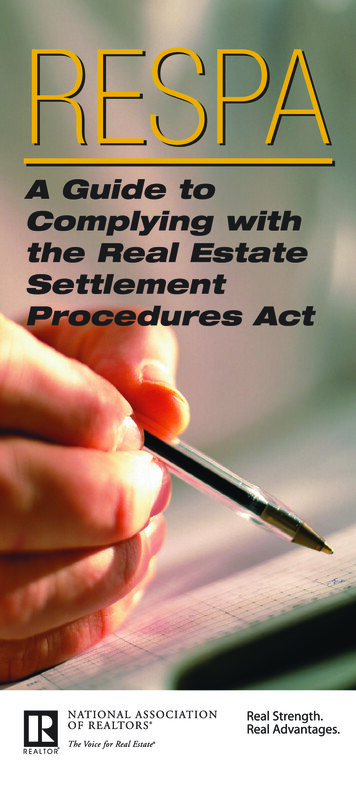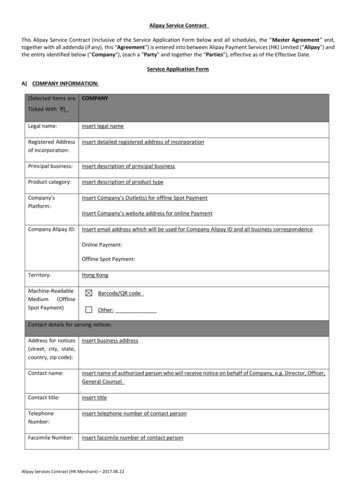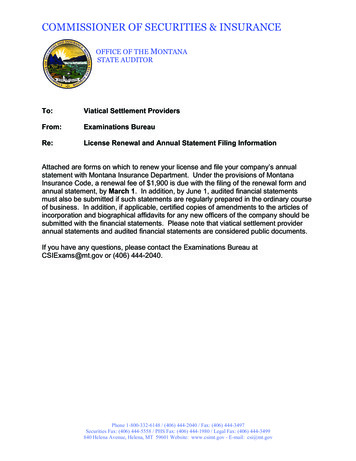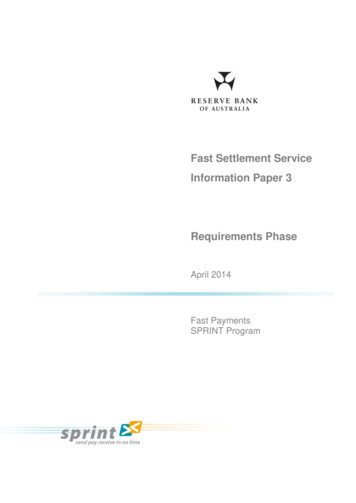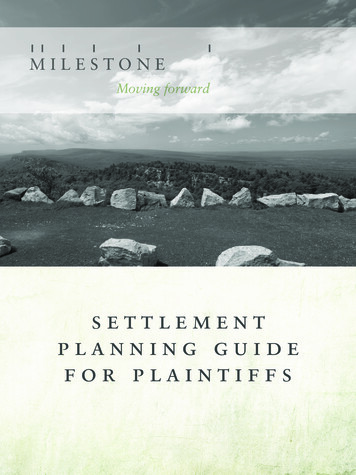
Transcription
settlementplanning guidefor plaintiffs
If you expect to receive a settlement as the result of a major injury or the death of aloved one, it is normal to feel overwhelmed. You may have questions about what todo with the money—should you invest it? Should you put it in the bank? How willyour government benefits be affected?The team at Milestone Consulting, LLC (“Milestone”) will help guide you throughthis difficult transition. Once our licensed settlement planners understand your needsand risks, we will work with you to develop a comprehensive settlement plan.Milestone uses strategies designed to balance your immediate needs with a diversifiedsettlement plan that maximizes your cash flow and asset preservation. We take theguesswork out of settlement planning and ensure a lifetime of financial security foryou and your loved ones.For your convenience, we have gathered our most frequently asked questions andcompiled them into this settlement planning guide. If you have additional questions,or wish to speak to a consultant about your settlement, please contact us toll-free at855-836-2676 or visit our website at www.milestoneseventh.com.Note: Milestone Consulting, LLC is a comprehensive settlement planning firm.This guide provides general information about settlement planning and should notbe interpreted as legal or tax advice. Please consult an attorney or tax advisor ifyou have questions concerning the legal or taxable/tax-free elements of a proposedsettlement.“[Milestone consultant] was always patient and tireless in his efforts to make sure thatwe made well-informed decisions that we were absolutely comfortable with in the end.The entire process was very easy and straightforward.”– Lisa*, Plaintiff*Names have been changed to protect the privacy of our clients.2Settlement Planning Guide
contentsSettlement Planning - 4Tax Implications - 4Structured Settlements - 5Government Benefits Preservation - 6Medicare Set-Asides - 7Trusts - 8Next Steps - 9milestoneseventh.com3
tax implicationsi s t h e se t t l e m e n t i r e c e i v eta x a b l e ?As a taxpayer, any monetary award that youreceive is assumed to be gross income and istaxable. Fortunately, the Internal Revenue Code(“IRC”) permits a taxpayer to avoid paying taxeson any settlement money (other than punitivedamages) received due to personal physical injuriesor physical sickness (see IRC §104(a)(2)). If themoney you receive from a settlement is due to aphysical injury, sickness, or wrongful death, youwill not pay tax on your settlement when youinitially receive it. On the other hand, if youinvest your settlement money into a traditionalinvestment vehicle or financial institution, such as alocal bank, the proceeds received from your interestbearing account are taxable to you.settlement planningw hat is settl ement planni ng ?Settlement planning is a process that requires a holistic lookat a plaintiff’s personal and financial situations. A settlementplanner will help the plaintiff develop a plan that can include acombination of structured settlement annuities, liquid investmentsand long-term investments. This combination will help you meetyour immediate needs, while preserving your wealth to take careof future needs. Your eligibility for government benefits is alsotaken into consideration; a settlement planner will work withyou to develop a plan that helps you maintain eligibility for theseimportant programs (if applicable).Most importantly, a settlement planner will act in your best interest,from mediation throughout the life of your settlement plan.once i receive my settlement, wh atop tions are ava i lable to me ?Your net settlement proceeds are available to you in the form of alump sum, unless there are restrictions placed within your settlementagreement. The lump sum available to you is the remainder afterattorney fees, case expenses, and any other deductions from yoursettlement, such as liens. You also have the option to receive yoursettlement proceeds in part, or in full paid to you over time viastructured settlement annuity (“structured settlement”).4Settlement Planning GuideIRC §104(a)(2) provides you with the optionto invest in a tax-exempt holding account or astructured settlement. It explicitly states that 100percent of every structured settlement paymentyou receive will be exempt from federal and stateincome tax.i have a family member whohas been injured, and i willbe receiving a portion of thesettlement. will i have to paytax on this settlement award?If you are a “derivative claimant” (i.e. a spouse,parent or child of a physically injured person) youwill not be required to pay tax on the money whenyou initially receive it (see Private Letter Ruling200121031, 5/29/2001, IRC Sec(s). 104). IRC§104(a)(2) states that if your claim originates fromphysical injury or physical sickness suffered byanother person, then all settlement money (otherthan punitive damages*) is viewed as an awarddue to physical injury, whether or not the personreceiving the settlement money is the injured party.*Punitive damages are compensation in excess of youractual damages (for example, settlement money receiveddue to loss of consortium as a result of your spouse’sinjuries is excludable from your gross settlement).
structured settlementsw hat is a stru ctured s ettlement ?A structured settlement is a mechanism that allows the injured party a means of deferring a portion (or all) of thesettlement, and receiving the proceeds when desired, as opposed to all at once. For example, you may take partof your settlement as cash to cover immediate expenses. The remainder of your settlement recovery is then usedto purchase an annuity through a highly-rated life insurance company, which then provides you with a series ofguaranteed, tax-free payments to meet your future needs.This process was first made possible in 1982, when a bipartisan coalition of legislators in Congress came together topass laws that amended the federal tax code. The Periodic Payment Settlement Act of 1982 (Public Law 97-473) wasa means of formally recognizing and encouraging the use of structured settlements in physical injury and wrongfuldeath cases.w ho is eligible to s tructure a set t l e m e n t ?You can elect to receive a structured settlement if you are settling a personal injury or wrongful death lawsuit.w hat are the benefi ts o f struc tur e d se t t l e m e n t s ?Structured settlement payments are tax-free, guaranteed income. Although lump-sum cash settlements are alsoinitially tax-free, the interest earned on investing that money is fully taxable. Also, unlike structured settlements, thereturn on any investment you make with a cash settlement is speculative and will vary over time.A structured settlement eliminates the burden of dealing with a lump sum settlement. Although most people believethey will be able to manage a large sum of cash, studies prove that most people spend 95% of their money within thefirst five years after settlement. Cash settlements are often depleted when recipients lend or give money to family andfriends, make risky or volatile investments, or purchase expensive items.A structured settlement is designed to ensure that your immediate and future needs will be met. Many people dependon their settlement for daily living expenses. You may design your structured settlement to include a monthly checkwith sufficient funds for food, clothing, transportation, and housing. Additionally, your structured settlement canbe used to fund your children’s educational needs or provide income for you when you retire. The fixed nature ofstructured settlements provides assurance, peace of mind, and a lifetime of financial security.Structured settlements are backed by the highest-rated insurance companies. This means a well-capitalized lifeinsurance company contractually guarantees your payments.w hen can i set up my struc tur ed se t t l e m e n t ?The choice of a structured settlement must be made before accepting the settlement proceeds in order to ensure taxfree benefits. You cannot accept the proceeds in cash now, and then later elect to create a structured settlement.a r e m y payments fi xed ?Yes; the nature of the periodic payment option is to provide a fixed stream of income to properly address your futureneeds. Payments cannot be accelerated.milestoneseventh.com5
government benefits preservationi f i receive gover nment b enefi ts , w i l l t h e se t t l e m e n t a f f e c t m ye l i g ibility ?Many of the government programs that provide you with monthly income, payments for medical services, or needsbased benefits have strict financial eligibility limits. Without careful planning, your settlement award may cause youto lose your eligibility for these programs. Milestone can help you determine what settlement options are available toyou in order to preserve your eligibility status.w i l l m y supplementa l sec uri ty i nc o m e a n d m e d i c a i d b e a f f e c t e d ?Supplemental Security Income (“SSI”) and Medicaid are needs-based government programs. SSI provides a guaranteedstandard of income to people who are age 65 , blind, or disabled with limited income and resources. Medicaid is afederal and state government program that provides medical-care coverage for low-income individuals and familiesand for the elderly and disabled. Medicaid benefits can cover items like prescription medication, transportation andhome-based care. Most individuals eligible for SSI are also eligible for Medicaid.Because these programs are needs-based, your award may adversely affect your eligibility. Certain assets, such as anindividual’s home and automobile, are not counted as available resources for the purpose of determining eligibility.Conversely, a person with 2,000 or more in a savings account is not likely eligible for SSI and Medicaid. Milestonecan assist you in determining which specific benefits may be affected and how to protect your eligibility.6Settlement Planning Guide
w hat can i do to pro tect s si a nd m e d i c a i d ?A Special Needs Trust (“SNT”) allows you to use a portion of your settlement award for items that can enhance thequality of your life without jeopardizing your eligibility for SSI and Medicaid, among other public benefits. A SNTmay be a consideration if you anticipate needing, or are currently receiving SSI or Medicaid.w i l l the settlement affec t my eli g i b i l i t y f o r S o c i a l S e c u r i t yD i sability and Med i care ?Social Security Disability (“SSD”) and Medicare are entitlement programs, so your award will not affect youreligibility for these programs. The SSD system was created to provide disability insurance for injured workers andtheir families. If a worker has paid a sufficient amount into the Social Security system, and is unable to engage insubstantial, gainful employment for a period of at least twelve (12) months, they are eligible for SSD. If you areapproved for SSD benefits, you will receive Medicare after you have been entitled to SSD benefits for two (2) years.Medicare does not pay for long-term care or many prescription drugs, but does pay for a portion of major medicalexpenses and hospitalizations.For those involved in Workers’ Compensation or liability settlements who will require future injury- or illness-relatedcare, the establishment of a Medicare Set-Aside account may be prudent.medicare set-asidesw hat is m edicare s et-as i d e ?A Medicare Set-Aside (“MSA”) is a fund created for the settlement of a Workers’ Compensation or liability case. Itis established from a portion of the settlement amount and is used to pay for future injury- or illness-related medicalexpenses that would otherwise be payable by Medicare. Funds must be established under an insured account andmay be managed by the injured plaintiff or administered through a custodial account. Milestone coordinates theadministration and set-up of your MSA through a third party to ensure that you are not over-funding the account.a r e m sas necessa ry ?The Medicare Secondary Payer Act (42 U.S.C. §1395y) established that Medicare is the secondary benefit payerbehind the responsible parties for Workers’ Compensation and liability claims. While current federal regulationsdo not require the use of MSAs, individuals involved in Workers’ Compensation and liability settlements are stillrequired to adequately consider Medicare’s interests.If future illness- or injury-related medical care will be needed, then a MSA is the preferred vehicle for protectingMedicare’s interests. Failure to do so can result in the Centers for Medicare and Medicaid Services (“CMS”) refusingMedicare coverage of all future medical treatments for the injured party. By establishing an appropriately fundedMSA, all parties to a settlement are protecting Medicare’s interest and are in compliance with the Medicare SecondaryPayer Act.how are msas fund ed ?MSAs can be funded in one of two ways: with a lump sum or with a structured arrangement (such as a structuredsettlement or a single premium immediate annuity [“SPIA”]).milestoneseventh.com7
s h o uld i fund wi th a lump s um o r a st ru c t u r e d a r r a n g e m e n t ?Utilizing a structured arrangement can provide considerable savings over a lump sum. If a lump sum is used to fundthe MSA, the entire amount must be exhausted before Medicare becomes the primary payer.Using a structured arrangement, on the other hand, requires an initial deposit in an amount equal to the first surgicalprocedure or replacement and two years of annual payments. After that initial deposit is made, the structure isdesigned to allocate regular deposits over a designated period of time. Once the funds are exhausted within a givenperiod, Medicare will pay primary for further injury-related expenses during that period.Milestone will assist all parties in assessing the different funding options to find the most cost-effective solution.trustsa m i eligible fo r a s pec i a l need s t ru st ?There are different types of SNTs, but they all share the same purpose of enabling an individual with a disability toenjoy the proceeds of a settlement, while maintaining government benefits eligibility. The term (d)(4)(A) trust (i.e.a “self settled” trust), is the most common type of SNT. To be eligible for a (d)(4)(A) trust, the beneficiary must beunder age 65 when the trust is established, and must be classified as disabled by Social Security Administration and/orState Medicaid Agency standards. If the trust is for a minor, the trust must be established by a parent, grandparent,or legal guardian, or by a court. The trust must contain a payback clause to reimburse the state for Medicaid benefitspaid during the lifetime of the beneficiary.Keep in mind, however, that when medical providers contract with Medicaid, they agree to provide services at asignificantly lower cost than if you had to pay for your medical care privately without Medicaid. When the trustee of“The whole settlement planning process was very efficient, which meant alot, because I was in a sort of state of confusion. I wanted to move forwardand be able to focus on myself physically—[Milestone consultant] helped getthe financial ball rolling so it wasn’t something I had to stress about. It putme at peace of mind.”*Names have been changed to protect the privacy of our clients.8Settlement Planning Guide– Charles*, Plaintiff
a SNT repays Medicaid for lifetime services, repayment will be for this lower amount and will be free of any penaltiesand interest. After reimbursing Medicaid, the trustee is responsible for paying the last expenses of the beneficiary,then must distribute the remaining assets.Milestone will coordinate with the Special Needs Alliance to find a local counsel to assist your lawyer in drafting aSNT to meet the special needs required by you or your loved one.i f im over age 6 5 , i s a po o led trust a n o p t i o n f o r m e ?For individuals over age 65, (d)(4)(C) (i.e. “Pooled Trusts”) are available. A Pooled Trust must be established andmanaged by a non-profit entity. The trust must maintain separate accounts for each trust beneficiary, but the fundsare pooled for purposes of investment management. Each separate trust account must be established solely for theindividual who is disabled as defined by law, and only that individual, the individual’s parent, grandparent, legalguardian or the court may create the trust.There are no age restrictions for Pooled Trusts. Any funds that remain in the individual’s account upon that individual’sdeath may be retained by the trust. Any funds not retained by the trust must be used to reimburse the state. This isreferred to as a Modified Payback Provision. Milestone will assist in finding the right pooled trust for you in yourhome state.next stepsOur team is available to answer any questions you may have. Please contact us toll-free at 855-836-2676 or visit usonline at www.milestoneseventh.com.Together, we will help you move forward.milestoneseventh.com9
milestoneseventh.comMilestone is dedicated to assisting injured persons throught the complexities of litigation andhelping them move forward with their lives. Please call for a complimentary consultation.737Main Street, Buffalo, NY 14203phone 716. 883 . 1 8 3 3fax 7 1 6 . 8 8 3 . 2 1 2 4toll-free 8 5 5 . 8 3 6 . 2 6 2 7
Structured settlement payments are tax-free, guaranteed income. Although lump-sum cash settlements are also . initially tax-free, the interest earned on investing that money is fully taxable. Also, unlike structured settlements, the return on any investment you make with a cash settlement is speculative and will vary over time.
